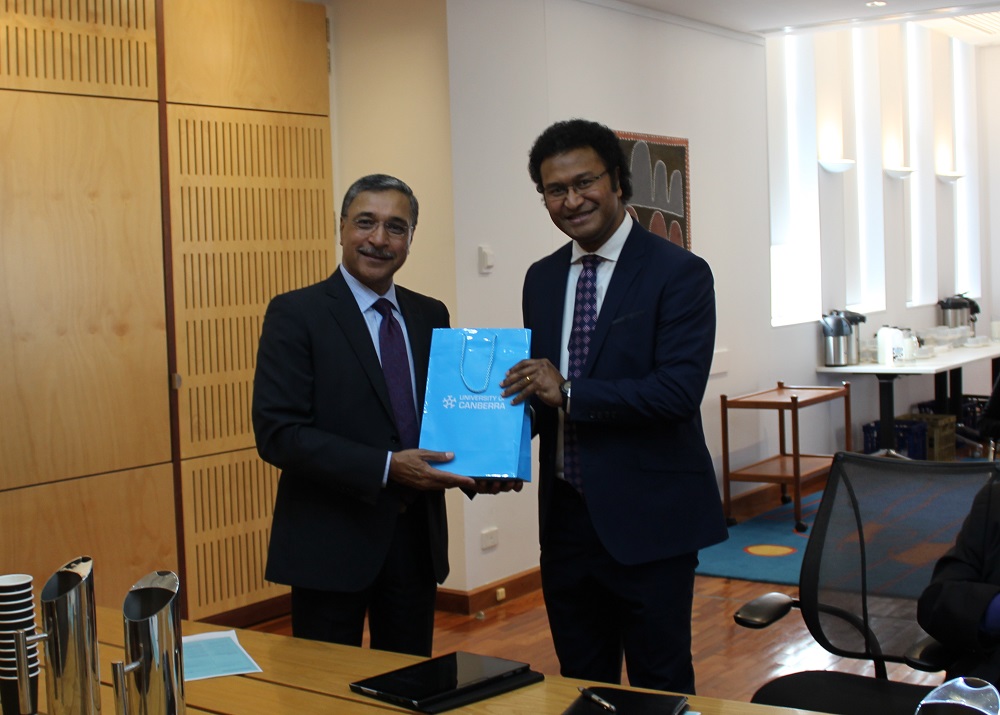Suzanne Lazaroo
19 October 2018: A term for inclusive dialogue and sharing in an air of mutual respect, ‘talanoa’ is a well-known concept on Fiji and in the South Pacific – and lends itself wonderfully to the sphere of education and learning.
Its spirit was evident at the University of Canberra’s recent Fiji Projects and Initiatives Seminar, which showcased various Fiji-based projects and research for newly-arrived Fiji High Commissioner to Australia, His Excellency Mr Luke Daunivalu and a small group of dignitaries.
Organised by Associate Professor of Landscape Architecture Dr Scott Heyes from the Faculty of Arts and Design, the seminar presented a diverse cross-section of projects and potential areas of collaboration.
“We wanted to highlight the great work our researchers and schools are doing, and the arrival of the new High Commissioner provided an opportunity to do that,” Dr Heyes said.
The previous Fiji High Commissioner has convened such seminars since 2014, with this being the first on campus; previous seminars were held at the Fiji High Commission in Deakin.
The projects were gathered from across the University’s faculties and schools.
“I often think that kind of organic growth can create something stronger, because you build on well-fortified scaffolding,” Dr Heyes said. “We see this seminar as creating momentum for even greater collaboration opportunities.”
From left: University of Canberra Vice Chancellor and President Professor Deep Saini and Fiji High Commissioner to Australia, His Excellency Mr Luke Daunivalu. Photo: Frank Guo
The seminar opened with the University’s Vice Chancellor and President Professor Deep Saini welcoming the High Commissioner, his delegation and attendees.
“The University of Canberra places great emphasis on the importance of deepening our involvements in Fiji,” he said. “The renewal of the MoU between the University of Canberra and the University of the South Pacific (USP) earlier this year is just one example of our commitment to Fiji and the region.”
“The University has strong ties and cultural connections with Fiji, as there has been a great interchange of staff and students,” Dr Heyes said.
There were eight presentations scheduled for the seminar, including one from Bachelor of Science in Psychology and Bachelor of Sport and Exercise Science student Jai Cornish-Martin, who visited Fiji last year under the New Colombo Plan initiative.
A Kunja man, Mr Cornish-Martin discovered a deep community connection which resonated strongly with him as an Indigenous person. “The connections made and knowledge gained was amazing,” he said.
Master by Research Candidate Loata Debra Ho at the Faculty of Art and Design presented on her work with iTaukei architecture and women’s knowledge, which looks at empowering women in remote and rural areas with access to services and life skills.
“I am looking at how Fijian women’s traditional culture can be bridged with modern values, without imposing the latter on the former,” she said. “There must be balance, and we need to understand the cultural context in order to know what works.”
Dinesh Kumar, a PhD student at the University’s Faculty of Science and Technology and lecturer at USP shared his work on Artificial Intelligence in medical diagnosis, and explored its many potential applications in the Fijian context.
Professor Rob Davidson, Head of the School of Health Sciences under the Faculty of Health, spoke about the trip 20 medical imaging students made to Fiji National University (FNU) this year, under DFAT’s New Colombo Plan Program.
“We’re collaboratively developing a graduate ultrasound program for FNU, which will benefit patients in Fiji and other Pacific Islands,” he said.
Associate Professor Dr Benedict Sheehy, Head of the School of Law and Justice under the Faculty of Business, Government and Law outlined the many possibilities for University collaboration via legal education partnerships in Fiji.
Dr Elke Stracke, Associate Professor in Applied Linguistics and TESOL, spoke about her work conducting external reviews of the ELSA (English Language Skills Assessment) test and the EL001 (English Language Skills) course at USP.

Some of the presenters with dignitaries and organisers at the Fiji Projects and Initiatives Seminar.
Photo: Neelam Singh
As the Program Director of TESOL at the University of Canberra, she elaborated on her recommendations for improving English curriculum development and literacy issues at the university.
In his closing comments, Professor Dharmendra Sharma, Professor of Computer Science and Chair of the Academic Board at the University emphasised the importance of the region.
“We are always thinking of Fiji as in our backyard – but I think it’s in our front garden, actually,” he said.
Hindu Council of Australia Vice President Kanti Jinna OAM, who attended the seminar, said that he was impressed by the presentations, and the opportunities and support provided by the University of Canberra.
“I was enthralled by Jai’s insights on the spirituality, understanding and the appreciation he had for the sensitivities of the Fijian beliefs of the Vanua and those of the Indo Fijians through their temples and religious institutions,” he said.
“There’s an immense amount of interest in Fiji and the South Pacific region from China, and Australia certainly has a role to play in that diplomacy,” Dr Heyes said. “And there is massive potential for more research in Fiji, which is a developing nation welcoming of outside support and articulation arrangements with Australian institutions.
“There is so much passion and interest in the region, as well as community support from both our countries.”
Next year, Dr Heyes is planning to lead a team of researchers on a joint project with the Fiji Museum in Suva, Fiji’s capital. “We’re on a mission to document cultural sites that are important to Fiji’s story, and which have never been documented except in oral history.”



